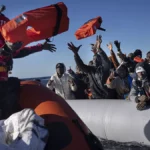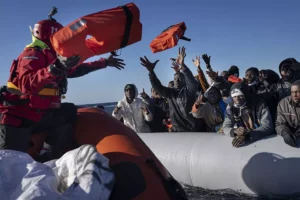In Tunisia, DW Akademie supports free and comprehensive access to information, while strengthening science and health journalism.
Tunisia’s recent derailment in its democratic process is reflected in its declining freedom of the press. Ranked 94th out of 180 countries in Reporters Without Borders’ 2022 World Press Freedom Index, the country dropped 21 positions from its ranking (73rd) in 2021. The decline is primarily due to the authoritarian governance of President Kaïs Saïed, whose self-coup in July 2021 resulted in the abolishment of the separation of powers. The outcome of the constitutional referendum one year later further deteriorated the working conditions for journalists. Those critical of the president face mounting pressure and intimidation from government officials and citizens loyal to those in power. Arrests of journalists have also increased. However, the media are still seen as key players in defending the country’s democratic gains, whether through sourcing, contextualizing and disseminating verified information, or as a good example for citizens in how to handle information.
Nevertheless, the country’s media system has been further weakened by the ongoing economic crisis, with non-state media struggling to remain financially viable. And, for journalists to produce quality content, they need to be adequately paid. This means that non-state media, and especially local ones, find it difficult to provide audiences with reliable information on issues such as community affairs, budgeting and civic participation. The coronavirus pandemic has further exacerbated the media’s position, while journalists themselves often lack professional training.
Our activities
DW Akademie’s projects in Tunisia focus on free and comprehensive access to information. The Smart Media Accelerator project includes MEDIA LOVES TECH a media incubation program for media startups. Launched in 2018 together with Al Khatt, a Tunisian media NGO and DW Akademie partner, the annual competition program supports young media initiatives in developing prototypes that combine quality journalism with digital innovation. The program also helps teams get their invention ready for market release. The accelerator program also offers “Media Parcours”, an advanced program for products already on the market. It provides teams with additional support regarding digital transformation processes, business models and formats. Teams applying to the programs are selected by a jury.
In 2023, an online course focusing on science and health journalism was launched for Arab-speaking journalists in the MENA region. Called “Dalilak Liloloum” (“Your guide to science”) the MOOC (Massive Open Online Course) is for specialized journalists wanting to deepen their expertise and practical skills at their own pace. The course was developed together with the Carthage Health Association, a Tunisian NGO, and additionally offers online events for networking.
The project Pop-Up Think Tank Tunis focuses on additional networking and dialogue possibilities. Launched in January 2023, it offers sessions, roundtable discussions and cultural events on how science journalism can contribute to solving environmental and climate crises. The think tank also provides a physical coworking space for dialogue.
As part of an EU-funded European consortium (“Programme d’appui aux médias en Tunisie II” that runs from 2021 to 2026), DW Akademie supports digital innovation in the media and, together with private and citizen media, develops new business models. DW Akademie also offers communication training for Tunisian public authorities, as well as journalism training for media workers.
Together with local partners, DW Akademie has conducted projects in Tunisia since 2011, and in 2013 opened its office in Tunis. DW Akademie and its program were officially registered in Tunisia in 2021.
Funding: German Federal Ministry for Economic Cooperation and Development (BMZ), German Federal Foreign Office (AA), European Union (EU)
Source : Deutsche Welle

















Add Comment